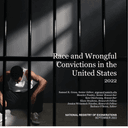
Two researchers at the University of Pennsylvania’s Wharton School, Professors Justin Wolfers (pictured) and Betsey Stevenson, recently explained why decades of studies have failed to show a reliable deterrent effect from the death penalty. The authors cited a 2012 report from the National Academy of Sciences, concluding that the deterrence studies of the past 30 years “should not influence policy judgments about capital punishment.” Wolfers and Stevenson explain why these studies cannot be relied on regarding whether the death penalty deters murder:
–the death penalty is applied extremely rarely (1 execution in 500 murders), which makes empirical study of its impact difficult to measure;
–homicide rates fluctuate for reasons completely unrelated to capital punishment (homicide rates tend to rise and fall roughly in unison across states, regardless of whether they have the death penalty);
–a more vigorous use of the death penalty likely occurs at the same time as other criminal justice changes, and it is impossible to separate the effects of the death penalty from the effects of these changes; and
–most importantly, there is no evidence on how potential murderers perceive the risk of execution if they are caught, which is key to determining whether capital punishment is a deterrent.
The authors also cited the research of Wolfers and John Donohue of Standford, who concluded, “There’s ‘not just “reasonable doubt” about whether there is any deterrent effect of the death penalty, but profound uncertainty.’” They further concluded, “Overall, the [National Academy] panel’s conclusions are a welcome corrective to a debate in which politically expedient, yet imperfect, findings have attracted greater attention than those rare moments of humility when we social scientists admit what we don’t know.”
(B. Stevenson and J. Wolfers, “The Death-Penalty Represents a Market Failure,” Bloomberg News, June 11, 2012). See Deterrence and Studies. Listen to DPIC’s podcast on Deterrence.



